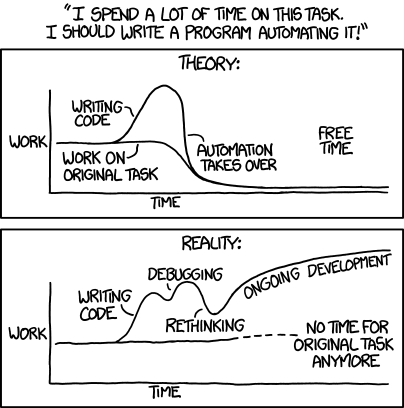
5 Reasons Your Competitors are Adopting RPA
In today’s competitive business market, Robotic Process Automation (RPA) has emerged to streamline operations, enhancing efficiency, and drive productivity. Competitors are embracing RPA and reaping the benefits.
1. Efficiency Enhancement
RPA revolutionizes mundane tasks by automating repetitive processes, freeing up valuable time for team members to focus on higher-value activities. By eliminating manual activity, RPA ensures accuracy and accelerates task completion.
The boost to business process execution for office staff can have a ripple effect to other parts of the business.
2. Cost Reduction
RPA enables significant cost savings by minimizing human errors, reducing manual effort, and provides the potential for optimizing resource allocation.
By reducing the unit cost to execute business processes there is the potential for savings or re-allocation of budgets.
Of course, with any automation the biggest savings are made when the automation capacity is close to full utilisation.
3. Improved Accuracy and Compliance
Human errors can be costly and detrimental to business operations. RPA ensures consistent accuracy in executing tasks, minimizing the risk of errors and enhancing compliance with regulations.
Repeated execution of business processes on by staff on computer systems is often seen as boring work. The more mundane the task, the harder it is for people to give full attention 100% of the time and therefore errors creep in.
Some errors will be caught during the execution of the business process allowing immediate correction by the operator. This has a relatively small impact in terms of the time to correct the mistake.
The more damaging errors are where the wrong values are used but they are actually valid in some situations or where parts of the business process are not fully completed (e.g. Tick Box confirming that a credit check has been done).
RPA is good at the boring work.
4. Scalability and Flexibility
Scalability is essential for businesses aiming for long-term growth. RPA systems are highly scalable, capable of handling increased workload demands without compromising performance.
RPA offers flexibility, allowing both growth and where necessary a reduction in activity. Switching off automation capacity does not involve complex HR processes of “Reduction in hours” or “Redundancy”.
Once RPA processing capacity is in place, it can be used by any automation. If the balance of the automation workload changes or priorities need to be changed, it is normally a small configuration change to implement. This makes the solution flexible.
5. Enhanced Scheduling Options
Once a task in a business process is automated, it no longer requires a person to be available for the task to be completed. This opens the possibility to re-schedule the work.
Consideration needs to be given on when the task can start and when it needs to be completed. Would changing the scheduling have any knock-on impacts?
Automation processing capacity is usually available 24 hours a day, 7 days a week. In many businesses, automating the tasks that people complete during the working day can provide an opportunity for the work to be undertaken overnight. Such changes can reduce business process cycle times with corresponding benefits to overall operations.















